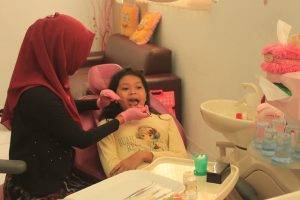What To Do When Visiting Dentist Specializing In Autistic Kids

Taking kids to the dentist is often considered a challenging task, but when a child has autism, it adds an extra layer of complexity. In this article, we will delve into the unique considerations and provide valuable tips for parents preparing to take their children with autism to a dentist specializing in autistic kids.
Why Kids Don’t Usually Like the Dentist?
Dental visits are often met with reluctance from children due to the unfamiliar and sometimes intimidating aspects of the environment. The clinical setting, the presence of unfamiliar faces in white coats, and the array of dental instruments can create an atmosphere that triggers discomfort or fear. Children may associate the dentist with past experiences of discomfort, leading to a natural resistance to these appointments. The fear of the unknown, coupled with the anticipation of potential discomfort, contributes to anxiety surrounding dental visits.
For children with autism, these challenges are amplified. Heightened sensory sensitivities, characteristic of autism, make the dental environment overwhelming. Unpredictable sounds, bright lights, and unfamiliar sensations can be distressing for a child with autism, further complicating their ability to navigate and tolerate dental procedures. The disruption to their routine, combined with the sensory assault, makes the dental visit a daunting prospect for both the child and their parents.
How Difficult It Is To Take Kids with Autism to the Dentist?
Bringing kids with autism to the dentist poses distinctive difficulties arising from the fundamental traits of the condition. Sensory sensitivities, a hallmark of autism, can make the various sounds and sensations in a dental office exceptionally distressing for these children. The routine nature of dental procedures may be disrupted, causing discomfort and anxiety.
Communication difficulties further complicate the experience. Children with autism may struggle to express their feelings or discomfort verbally, making it challenging for both parents and dental professionals to understand and address their needs effectively. The inability to communicate pain or anxiety may result in increased stress for the child, hindering cooperation during procedures.
The reliance on routine in children with autism is disrupted by the unpredictable nature of dental visits. The unfamiliar setting, coupled with the need for flexibility during procedures, can lead to increased anxiety and resistance. These children, who frequently seek comfort in predictability, may face particular difficulty in the absence of a routine.
In essence, the difficulty of taking kids with autism to the dentist arises from the convergence of sensory sensitivities, communication barriers, and the disruption of routine. Proactively recognizing and dealing with these challenges can markedly enhance the dental experience for both the child and their parents.
What Can You Do to Prepare The Kids?
Taking proactive steps to prepare children with autism for dental visits is crucial for a successful and positive experience. Here is an in-depth guide on how to navigate through the preparation process:
1. Selecting the Right Dentist
Discovering the appropriate dentist is the fundamental stage in guaranteeing a positive dental encounter for kids with autism. Look for a pediatric dentist with specialized expertise in caring for children on the autism spectrum. Look for certifications or specialized training in autism-friendly practices. A dentist possessing this knowledge is better equipped to comprehend and address the distinct requirements of your child.
2. Orientation Appointment
Schedule an orientation appointment before any dental work takes place. This initial visit allows your child to familiarize themselves with the dental office environment without the stress of procedures. During this appointment, they can explore the waiting area, meet the dental staff, and gain an understanding of the tools used by the dentist. Creating a positive association with the dental office during this orientation sets the stage for a more comfortable experience during actual dental visits.
3. Timing Matters
Request appointments during the calmest and quietest part of the day. This strategic scheduling helps prevent sensory overload, a common concern for children with autism. A quieter environment can significantly contribute to a more relaxed and manageable experience for the child, reducing the likelihood of anxiety or stress during the visit.
4. Communication
Open and clear communication is key to preparing the dental team for your child’s specific needs. Clearly articulate your child’s sensory sensitivities and any strategies that have proven effective in making them feel at ease. Whether it’s a preference for dimmed lights, the use of sensory-friendly tools, or specific communication methods, sharing this information ensures that the dental team can create a more accommodating environment.
5. Private Exam Room
Request a private exam room for your child’s dental appointment. This creates a quiet and comfortable space, minimizing external stimuli that could contribute to sensory overload. A private room provides a more controlled environment, allowing your child to feel at ease and reducing potential stressors associated with a shared or open space.
6. Paperwork in Advance
Streamline the dental visit experience by completing the necessary paperwork in advance. Many dental offices offer online options for completing intake forms before the appointment day. This not only saves time but also minimizes stress for both you and your child on the day of the visit.
7. Establish Expectations
Collaborate with the dentist to establish a clear plan for the appointment. Kids with autism typically flourish in a structured and predictable environment, making it essential to steer clear of unexpected surprises or sudden alterations. Establish expectations for each step of the dental visit, from entering the office to the completion of procedures. Establishing a predetermined strategy contributes to a feeling of security for the child, lessening anxiety and fostering collaboration.
By following these steps, parents can empower their children with autism to navigate dental visits with greater ease and comfort. Each proactive measure contributes to a more positive and manageable experience, fostering a foundation for better oral health in the long run.
Preparing Your Kids with Autism will Make the Dentist Trip Manageable
In conclusion, taking kids with autism to the dentist requires thoughtful preparation. Starting with the selection of the right dentist, through orientation appointments and clear communication, each step contributes to a more manageable and positive experience for both the child and the parents.
Establishing a comfortable and trusting relationship with a dentist specializing in autistic kids is crucial for the overall oral health of children with autism. By taking proactive steps like scheduling orientation appointments, communicating specific needs, and selecting the right timing, parents can significantly improve the dental experience for their children. With proper preparation, dental visits for kids with autism can become a manageable and even positive aspect of their healthcare routine. Keep in mind that cultivating a supportive atmosphere for the well-being of these exceptional children hinges on patience and understanding.

